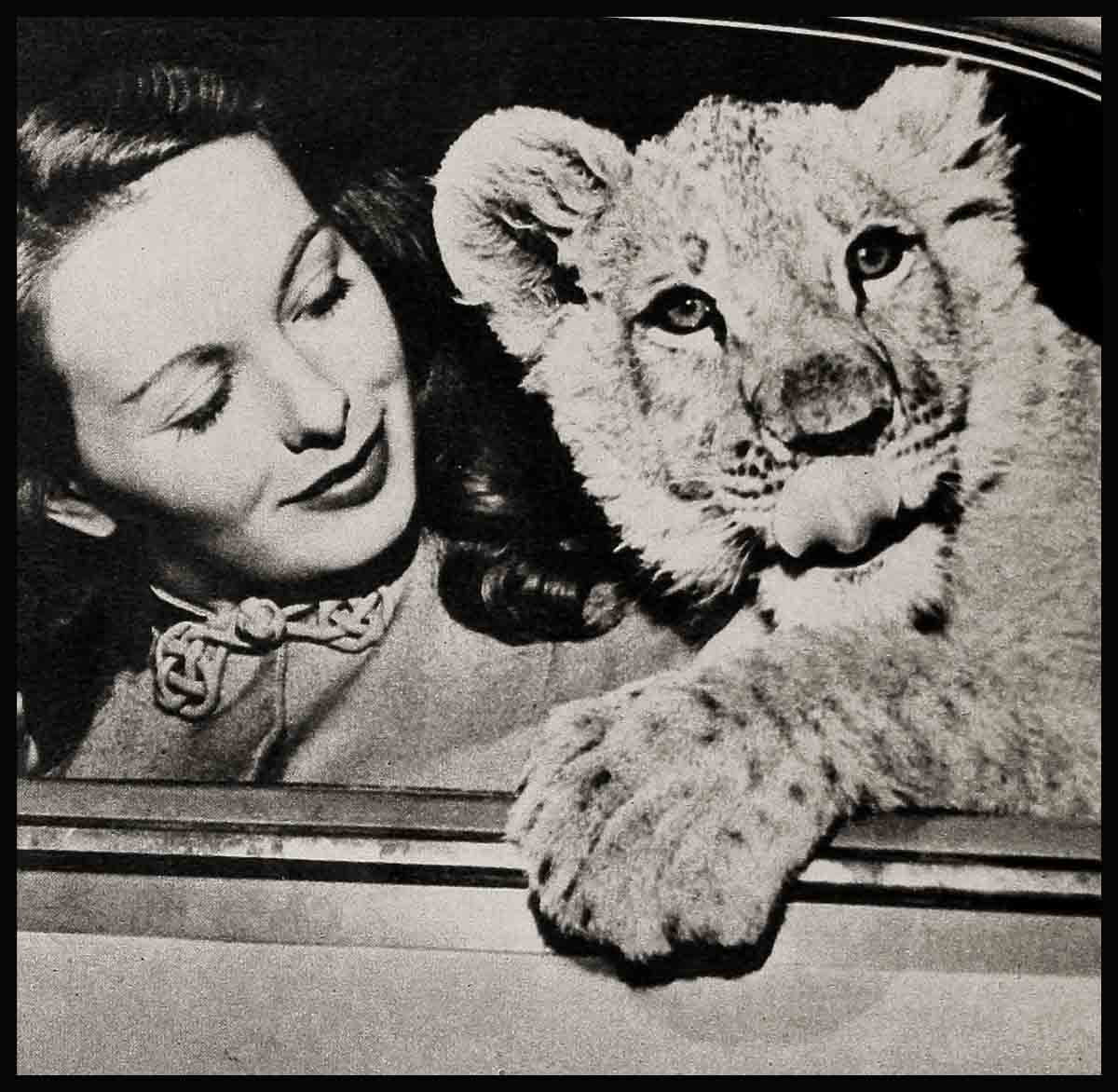
It’s Reigning Cats And Dogs
Once upon a time the phone rang in a West Los Angeles police station and the caller wanted to know what the local ordinance was about peace-disturbing lions.
“Did you say lions?” asked the desk sergeant politely.
“That’s right,” said the caller. “There is a roaring lion in the yard next to me and I can’t sleep. I,” he added thoughtfully, “am a lion-hater.”
“You’re a lyin’ something,” murmured the sergeant, who had practically cut his teeth on Joe Miller, “but we’ll be around.”
Since lions are a little better than par for the course even in pet-daffy Hollywood, the sergeant was inclined to jocularity as he contacted the handiest squad car. The squad car was similarly lighthearted as its team poked their flashlights into the back yard of Paul and Jeanne Crain Brinkman. Naturally there was nothing there except a roaring lion. Slightly taken aback, the policemen sprinted for the front where they fell against the Brinkman doorbell. Presently the masters of the house emerged.
“Uck,” said the senior member of the law, loosening his necktie a trifle.
“Uck to you,” said Mr. Brinkman courteously. “But surely you didn’t wake us up just to say that? There must be something meatier on your mind, something—”
“Lion,” gurgled the law, a word extremely difficult to gurgle.
“Lion,” said Mrs. Brinkman encouragingly. “Keep going and we’ll ask questions when we’re stuck.”
The law recovered its dignity. “You have a roaring lion in your yard,” it said, “and you can’t have. I think.”
“Nonsense,” said Mrs. Brinkman firmly. “Shah-Shah doesn’t roar.”
“Must be some other lion,” said Mr. B.
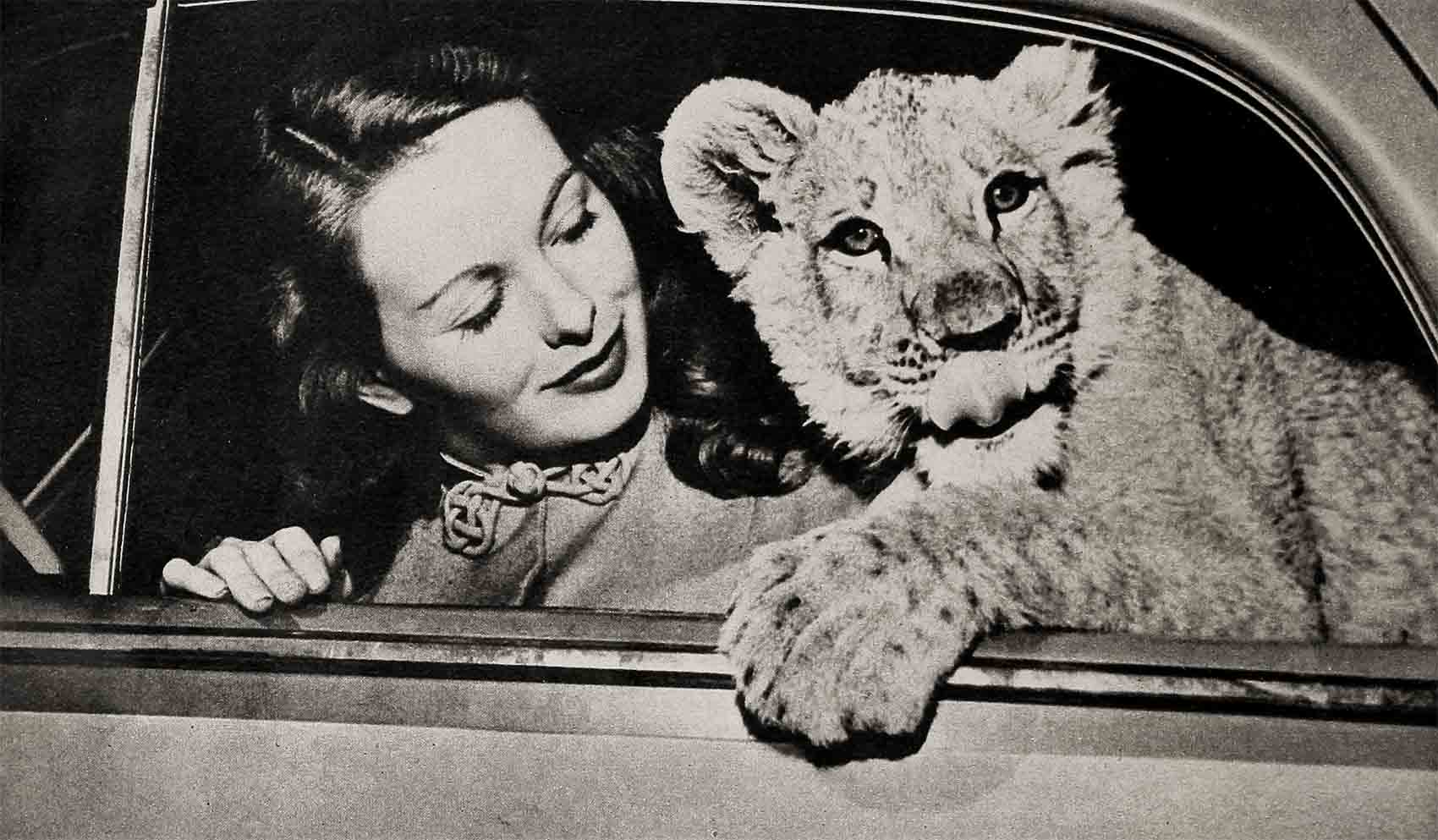
The law pushed its cap back on its head and ran its hand down its face in a-gesture made classic by the late Edgar Kennedy. “It’s this lion,” it said with ominous quiet. “There is an ordinance about it, too. There has to be. In fact, I ain’t sure there’s not an ordinance against just being a lion. But roaring—definitely.”
Oddly enough, the law was correct. Shah-Shah was a lion all right and still is—a female acquired by the Brinkmans at a Hollywood party. They’d raised her from a cub, principally in a three-room West Los Angeles apartment. Now, when they snapped the cuffs on her she was crowding 500 pounds. Regretfully, the Brinkmans handed her over to the curators of Griffith Park Zoo, where Shah-Shah has lived happily ever after, except for an occasional urge to break out and get the rat who sang on her.
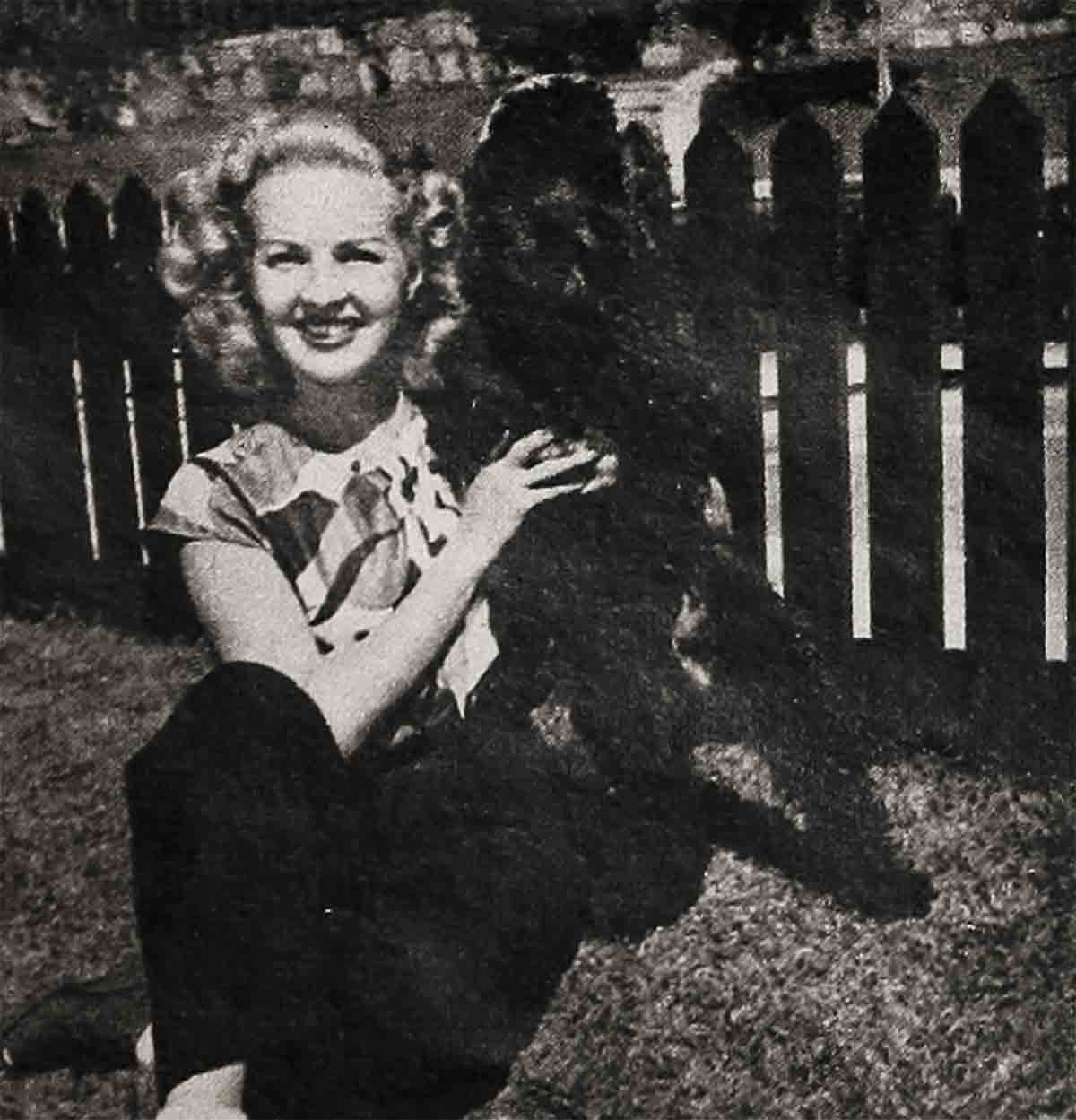
The Brinkmans later settled for a dog, which is more like it as Hollywood pet preferences go. Right now, dogs are running ahead of cats about seven-to-two. And cats are two-to-one over such peculiar choices as hamsters and possums, although the cats might not have been doing so well if it weren’t for James Mason’s much-publicized crew jogging the ratio. In fact, Hollywood’s taste in pets is all-embracing, covering chimpanzees, ponies, camels, one alligator and an armadillo. The late John Barrymore was deeply fond of an aged and incredibly ugly vulture but when he found it sitting on the foot of his bed eying him speculatively during one of his serious illnesses, Barrymore expelled it in a fit of rage.
But dogs are king, and nowhere are they more widely and dotingly maintained than here in Hollywood.
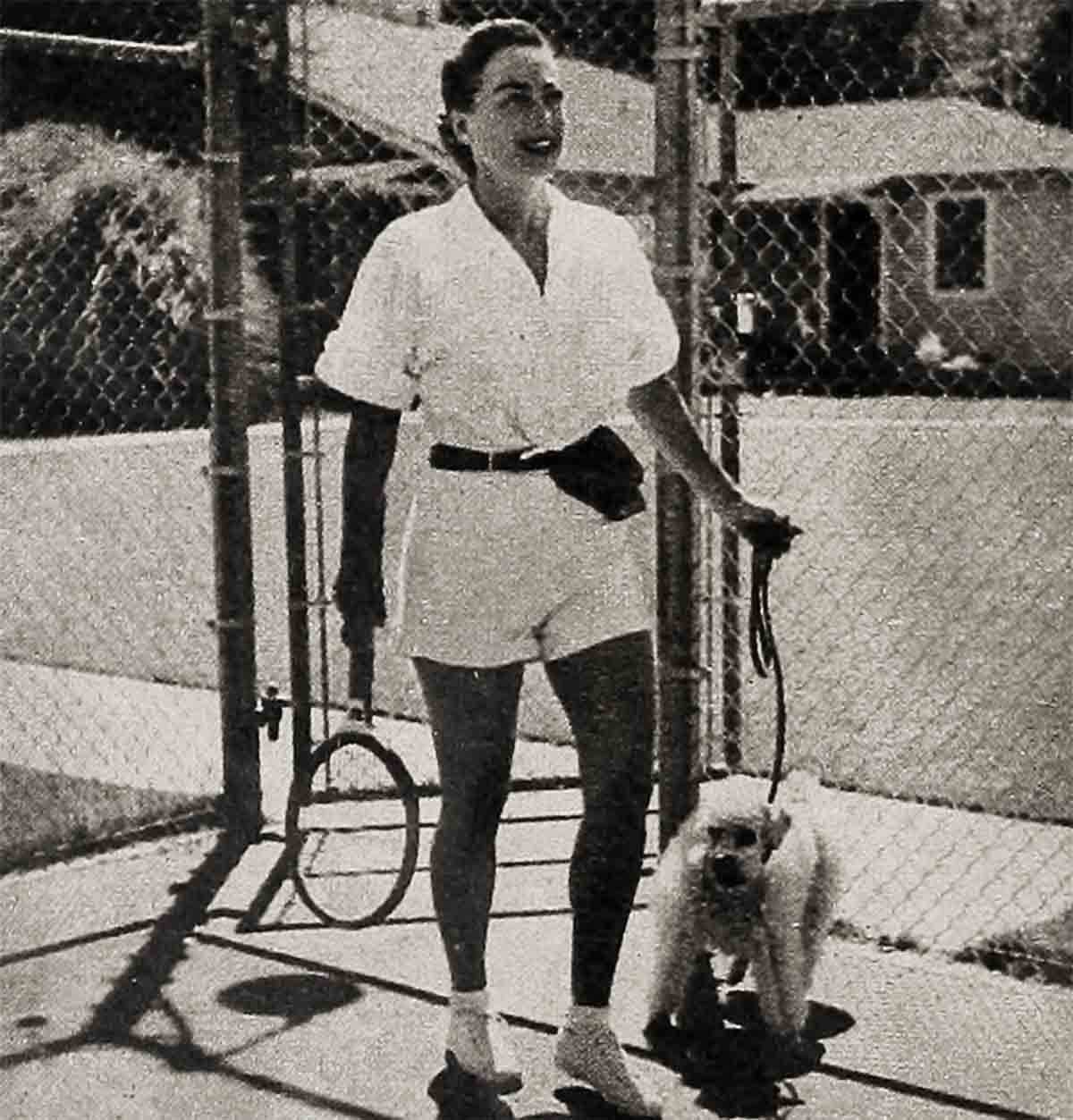
In other parts of the country it is possible to keep pets. without being suspected of anything more than normal humanitarianism, but not here. Indeed, a Los Angeles psychologist solemnly explained not long ago that with stars, keeping pets is a compulsion, for their egos must feed on the mute devotion of animals.
One famous actress took the trouble to refute this psychologist pretty thoroughly.
“If you want to go into it on a clinical basis,” she said, “it may be principally that we’re lonely. I don’t really want to make it clinical. I’ve never tried to analyze it. If I’d been asked offhand, I just would have said that we like pets, the way other people do. But now that you’ve brought it up, it definitely isn’t ego. Our egos are saturated as it is. You can get terribly lonely in the midst of friends—if they’re friends—whose motives you’re never quite sure of. You know, it’s the same as a wealthy person living behind a protective armor of distrust. But a pet just loves you because you’re you. He doesn’t want anything except to eat and play and stay alive. He doesn’t know you’re a star and he doesn’t care, and he wouldn’t know a house in Beverly Hills from a shanty. If you were washed up tomorrow, your friends wouldn’t know your name, but your pets—they’d still be there.”
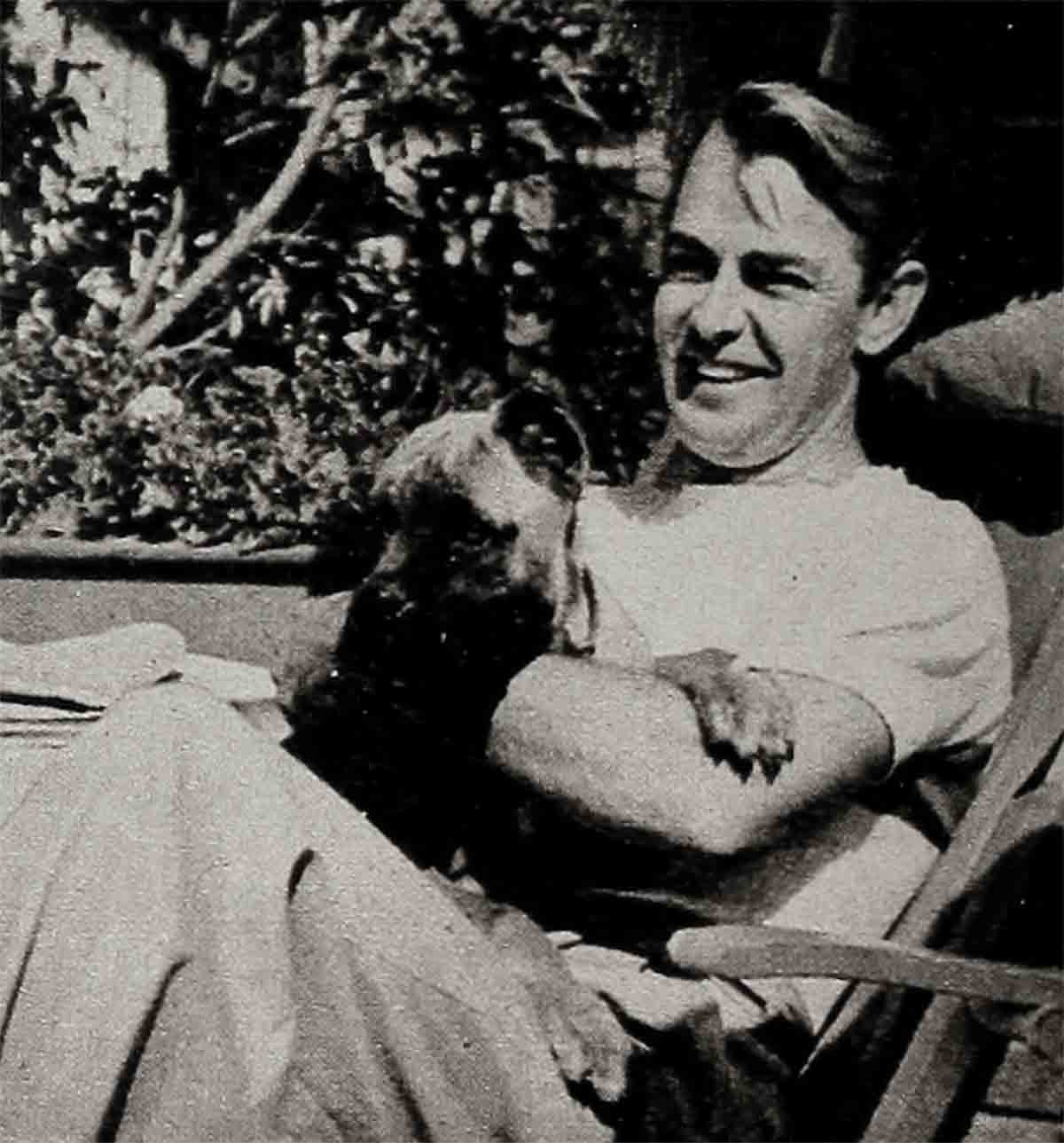
Although, nationally, cocker spaniels seem to have taken over the No. 1 spot in public dog fancy, they do not rate better than fifth in Hollywood. According to a loose survey conducted recently, the stars prefer in order, boxers, French poodles, collies, police dogs, cockers, and dachshunds.
Among the more ardent boxer devotees are the Alan Ladds, who keep two in their West Los Angeles home and seven (at last count) at their ranch. They are enamored in particular of an aging, heroic female named Jezebel.
Jezebel, Ladd sadly calculates, may not be long for this earth due to her zeal for biting automobile tires while the tire is doing 50 miles an hour. But so long as Jezebel is around, she gets the triple-A treatment with horsemeat on the side.
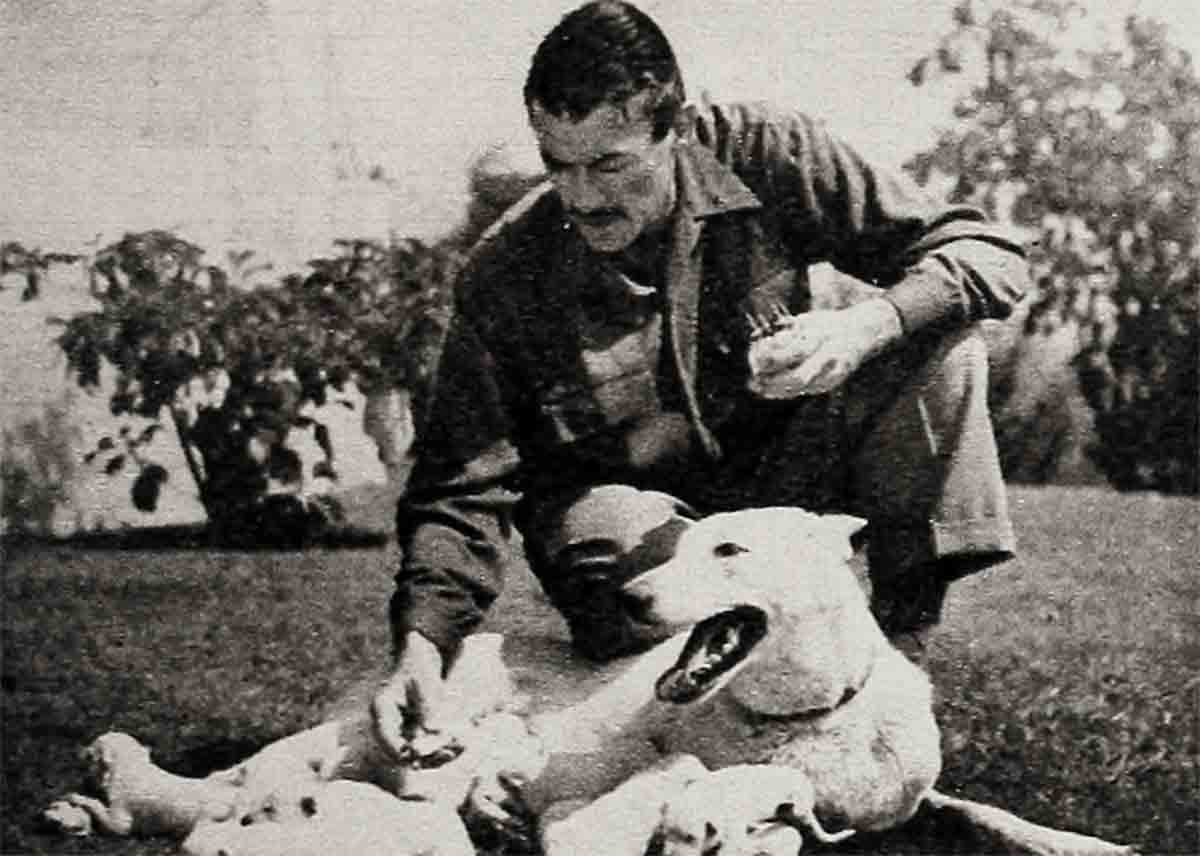
It was Jezebel, who saw a delivery truck backing in the Ladds’ drive while the Ladds’ little daughter Alana stood gravely in its path looking the wrong way.
Jezebel did all that she could. She bounded into the child, knocked her clear and took the blow herself. By the time Ladd got her to the vet’s she was as close to dead as a live dog can be, and she will never be in fighting trim again. But that has not stopped her where tires are involved. She can bite tires standing still but she prefers them on the wing, and if one of these days she tackles the enemy head-on instead of from the flank, Jezebel’s chances of a clean-cut decision will be very bad.
Jezebel’s masters served interne duty at the arrival of Macdonald Carey’s water-spaniel. Neither mother nor pup needed medical assistance, but Carey did.
Word of the pup’s arrival reached Carey at the Ladd ranch. And inasmuch as he’d been anticipating the event for some time and was duly joyous, he leaped into the air and continued straight on up until he met a rafter, at which point he naturally started down. He came down for a long time as unconscious as anyone ever gets, and had to be given scalp first-aid by his hosts before being rushed to a hospital for minor surgery. The spaniel shortly was named Stitch.
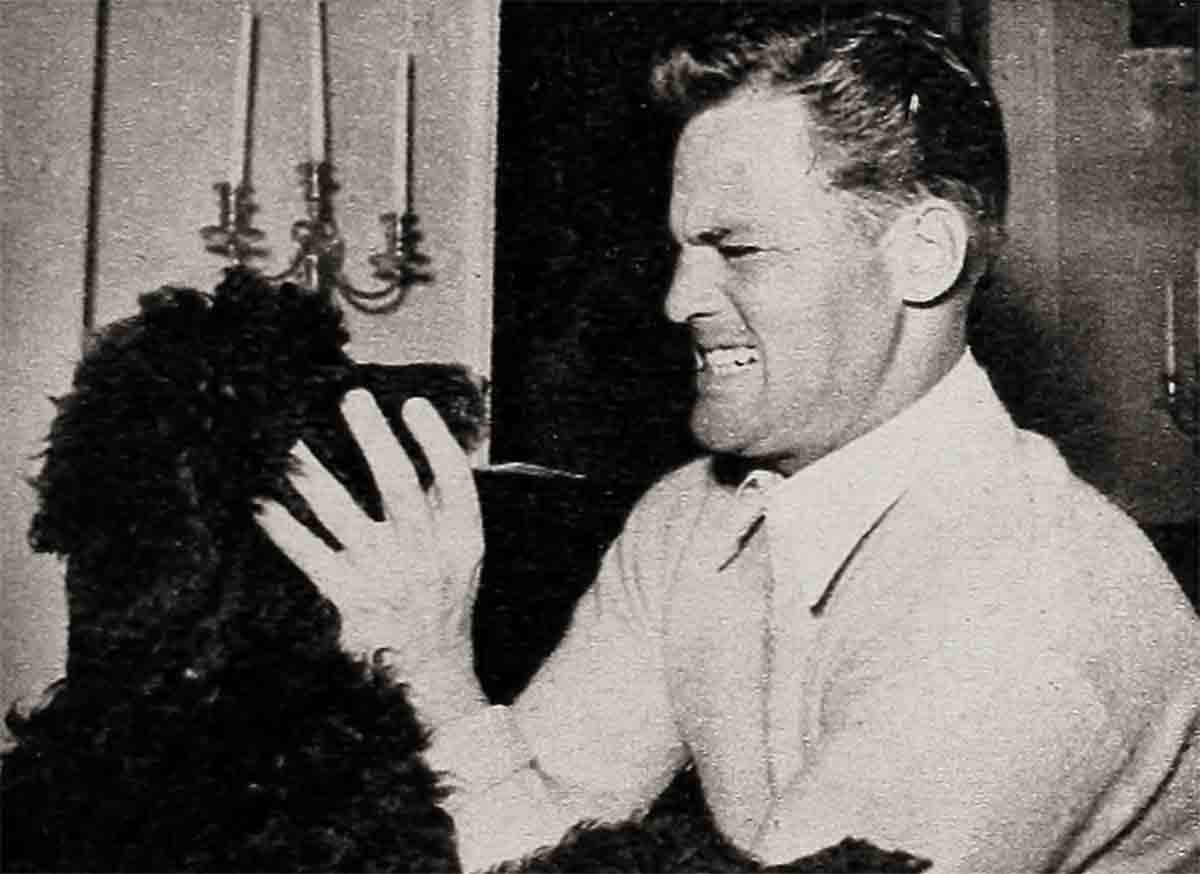
Stitch, according to his bemused master, has put a most fearful dent in the theory that Dogs Always Know. Stitch likes burglars and does not care a hoot for many kindly, upright, and dog-loving visitors who come to the Careys’ bearing him bones. (He doesn’t like bones. He likes Royal Crown Cola and chocolate eclairs.) Stitch adores the furtive type of gentlemen interested in selling Carey salted gold mines, but he has an antipathy toward powerful executives interested in furthering Carey’s career. Stitch doesn’t bite but there is still a vague suspicion chez Carey that the hand that feeds him had better be quick.
“The only time Stitch ever got real enthusiastic about me,” says Carey, “was when I was playing heavy parts and came home bearded and skulking like the dog of a rustler I was. He loved me then. If a prowler ever does get into the house, Stitch is going to give him coffee and sandwiches, show him the key to the silverware and slip him the name of a good fence. Whose best friend, I ask you?”
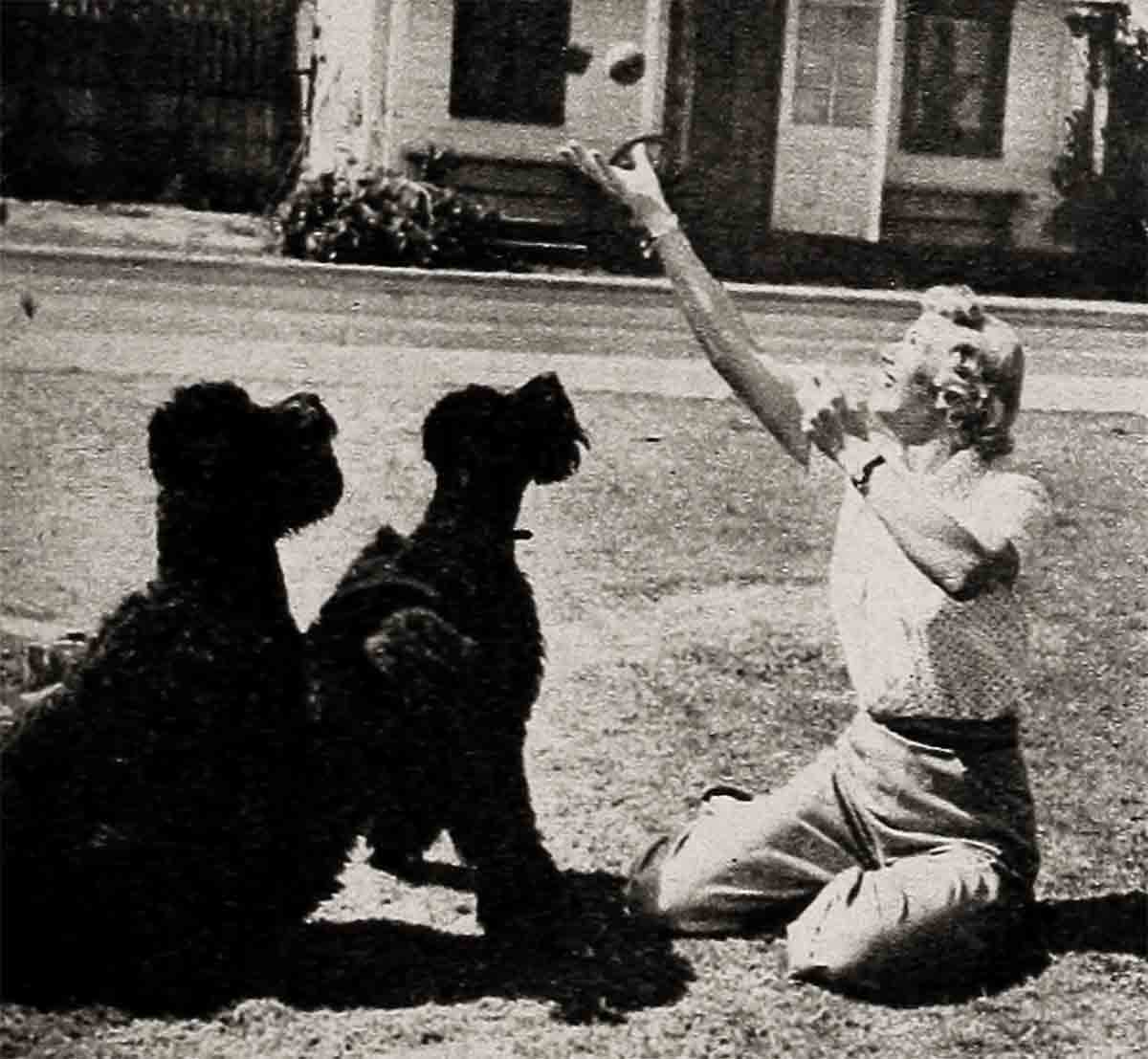
Carey’s problems are not unlike those of Doris Day, the proud but puzzled possessor of two black poodles named Beanie and Smudgy. Beanie, who hasn’t the faintest idea he’s a dog, eats oranges whenever he can get into striking position at his owners’ modest grove, whereas Smudgy has developed a violent anti-social bent. Smudgy likes nothing quite so much as snubbing Marty Melcher, Miss Day’s husband who adores him; jumping happily on the laps of guests who break out into nervous scrofula at any proximity to a dog, and wrecking the silk-lined antiques the Melchers lately have acquired. He is likewise devoted to soaking his feet in motor oil against the day when someone will turn up in a white flannel suit.
Yet some feel that the mantle of dog’s most tireless martyr belongs rightfully to Victor Mature, who is stubbornly infatuated with an obese German shepherd named Nicky.
Nicky has never yet been booked for forgery, embezzlement or assault with a blunt weapon, but she has been jugged so often that the local pound officials are thinking of giving her a monthly rate. The charge generally is running around without a muzzle, but not long ago she faced the stiffest rap yet: she was said to have bitten the postman. The postman so said. There were added mutterings that Nicky had long taken a dim view toward uniforms and their wearers, notably police, postmen and commissioned officers.
Mature was outraged. He invited all and sundry to behold the riot of Nicky being systematically pulled apart by the neighborhood children, an ordeal to which she does indeed submit with boundless tolerance. And for a while the day was saved.
Among the more harassed owners of small-fry dogs these days is Ava Gardner, whose Welsh Corgi puppy, Rags, has established squatter’s, rights to a pair of silver evening slippers Miss Gardner had always figured were hers. An absurb idea. The thing began one night as Miss Gardner was about to set sail for an opening and couldn’t find the sandals anywhere. It wasn’t until the next day that they turned up in Rags’ bachelor suite in the backyard. Patiently they were restored to a closet and just as patiently Rags preempted them again. There is nothing furtive about the thefts. Rags simply drags the shoes one at a time through the house, caches them in his own joint and then sits on them. Won’t go near any other article of the boss’s apparel. It’s silver slippers or nothing.
John Agar’s poodle, Ragmop, has a bit of larceny in him, too, although his heart’s in the right place. He’s forever delivering toys to Agar, whose only problem after that is finding out which of the neighbors’ children the toys belong to and returning them with apologies.
You can say this much for Ragmop, however: his besetting vice is not vanity, which is nice going for a poodle. If there’s any object in the world Ragmop regards with undisguised fear and loathing, it’s the four-legged black party in the mirror. The most casual glimpse of himself is enough to scare Ragmop for hours.
In Hollywood as elsewhere, multiplication of pets is not the sole monopoly of rabbits.
Anne Baxter’s poodle Shoofly once populated Anne’s tiny apartment beyond all reason. Anne and her husband John Hodiak were waiting to move into a house under construction, but there was plenty of room and no hurry.
Then all of a sudden it wasn’t like that at all. Shoofly startled everybody, including herself, by becoming the proud mother of six.
Compared to Gregory Peck’s two white police dogs, however, Shoofly was simply indulging in light exercise. Greg’s dogs have developed the cordial habit of delivering litters of 12 and 13 at a time at fairly regular intervals. It got so people couldn’t ask Mr. Peck for the time of day without being offered as many white police dogs as they could carry.
Although in Hollywood, properly cared for pets are often expensive to maintain, the cruelest single economic blow of the year thus far probably fell to Mitzi Gaynor, who acquired for $14.14 an intriguing animal believed to be half beagle and half buffalo. For a good many weeks Miss Gaynor was patrolling the lot chortling over the bargain and decrying the foolishness of laying down large sums of money for purebreds. Then one dark day the beagalo, to dignify it with a kennel name, came down with distemper. The vet’s bill: $120.
Once in a while a Hollywood animal, as in the case of Lassie, Leo, and the cat Rhubarb, will pay a modest return on its investment, but the stars themselves have had very little luck in this respect.
Betty Grable, for instance, has a French poodle named Punkin’ whom she trained assiduously not to bark on the set, inasmuch as poodles that do bark on the set are not looked on with any more favor than Bright’s disease. But then came a mildly momentous day when the script called for a French poodle named Punkin’ (or anything else) to come through a door and bark. Just like that, Miss Grable turned into an agent and Punkin’ was coerced through the door as the cameras rolled. But bark? Fat chance. Punkin’ knew only one score on that subject and it was the wrong one.
Joan Crawford’s toy poodle Cliquot is set-trained, too, as is Linda Darnell’s Schnoopsi, a dachshund with a great fancy for green sweaters. Schnoopsi, however, is not much of a hand with a knitting needle so Miss Darnell, while she was Mrs. Peverell Marley, was ever the one for grinding out tiny garments on the set and answering lots of foolish questions.
The era of the Russian wolfhound and the leashed leopard is dead so far as Hollywood is concerned, although Betty Hutton did come up lately with a lamb. And very recently, there’s been a move toward huskies, the wonderful Eskimo dogs that can be bred to great gentleness and appalling size.
On the whole, though, Hollywood’s dogs and cats are like everyone else’s—purebred or haphazard. Siamese, Persian and Angora dominate the cat element, but there are more than enough alleys to go around. And for the aristocrats, there’s a Motel for Cats out on Ventura Boulevard.
No amount of trouble, expense or patience is too much for the stars to make sure their adored animals are healthy and comfortable. Special doors are cut doors to allow untrammeled comings and goings. Bronze plates are affixed to baronial entranceways for scratching purposes. And there is a thriving turnover in dog and cat gadgets, including pillows, special hammocks and fur-lined catnip bags.
Let a cat cry or a dog hiccup and you have a million dollars’ worth of concentrated glamor throwing the mink coat on over the silk pajamas, and steering the Jaguar straight for the vet’s. The veterinarians in Hollywood are prosperous fellows indeed.
For it seems that Hollywood is in love with the animal kingdom—large, small or in-between. And happily enough, the animal kingdom returns the compliment.
THE END
—BY JOHN MAYNARD
It is a quote. MODERN SCREEN MAGAZINE SEPTEMBER 1951




